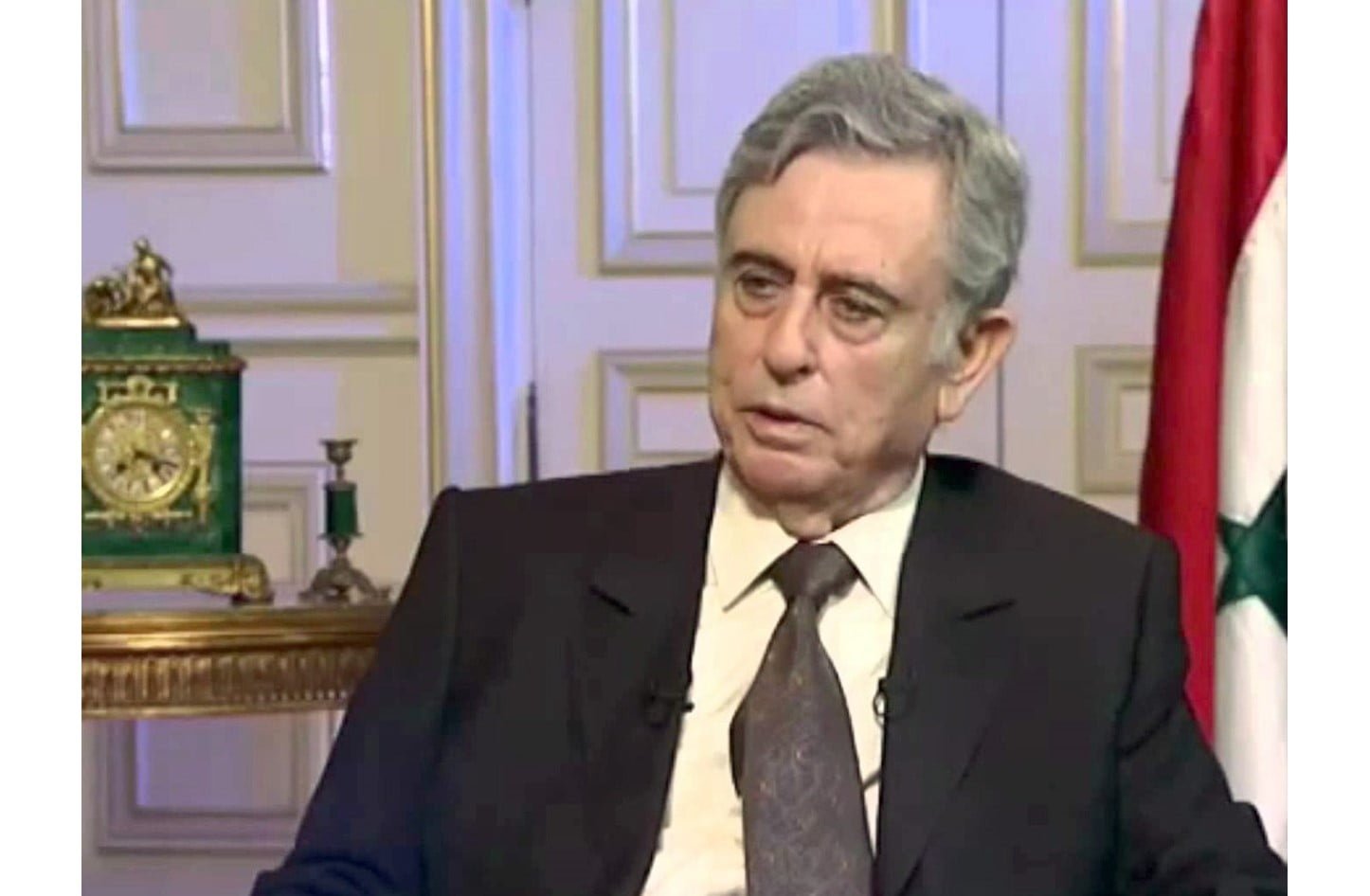Former Syrian Vice President Abdel Halim Khaddam, who is leading a media campaign aimed at overthrowing President Bashar al-Assad, is facing an unpredictable test.
A number of opponents and experts suggest that the opposition should remain cautious of this former regime figure.
Khaddam, 73, justified his actions in an interview with Agence France Presse this week, stating, “I have been in contact with figures from the Arab Baath Socialist Party and other parties in Syria, and further contacts will be made with others.”
“My call is directed to all Syrians to contribute to shaping the destiny of their country,” he emphasized, highlighting that “the Syrian people are discontented with the current regime, the oppression of the security services, the curtailment of freedoms, and the corruption within the inner circle of the head of state.”
Khaddam, accompanied by his son Jihad and several family members, met with former Chief of Staff General Hikmat Shihabi “in a friendly capacity” before publicly expressing his opposing stance and making bold statements to the media on December 30. The location of the meeting was not specified.
A close associate of the former chief of staff, who resides in Los Angeles, United States, stated that “Shihabi only wishes to be forgotten by all,” despite his name being mentioned in some media outlets as an opposition activist.
Khaddam, who sought refuge with his family in Paris, where they reside in a luxurious house, has significantly increased his media interventions over the past two weeks, with the objective of inciting a “popular uprising” against Bashar al-Assad.
He accuses the Syrian president of ordering the assassination of former Lebanese Prime Minister Rafiq Hariri on February 14 in a bombing attack that has been attributed to Damascus.
When asked about the motives behind his actions, Khaddam responded, “I decided to speak out after engaging with several officials and political forces.”
Regarding issuing his statements from France, where he relocated after resigning from his governmental duties and party membership in June, he explained, “The Syrian people are aware that if I had made this speech from Syria, I would have met the same fate as others.” He added that “the Syrian people understand the reasons behind my relocation to France.”
In the context of his criticism of the Syrian regime, he further added, “This regime does not tolerate any form of criticism. It fears granting people freedom and responds to them with violence. It is also apprehensive about making concessions in its dealings with outsiders.”
When asked if he intended to seek political asylum in France, Khaddam firmly stated, “Never.”
In a telephone conversation with Agence France Presse in Paris, Khaddam’s son announced yesterday that his father will remain in France and has no intention of relocating to Saudi Arabia.
Jihad Khaddam dismissed reports by certain media outlets suggesting that his father is under pressure from the French government to leave the country. He emphasized that there is no harassment from the French government, and in fact, the opposite is true. He also clarified that there is no plan or intention to move to Saudi Arabia.
He regarded these reports as “misleading” propaganda by the Syrian regime.
In Damascus, some opponents distanced themselves from Khaddam’s positions. Khaddam, who was once one of the closest aides to the late President Hafez al-Assad, ruled the country with an iron fist.
Ali Sadreddin Al-Bayanouni, the Comptroller General of the Muslim Brotherhood in Syria, announced from his exile in London that his organization is prepared to collaborate with Khaddam in bringing about regime change in Syria. However, he expressed skepticism about Khaddam’s proclaimed commitment to democracy.
Regarding the possibility of a popular uprising in a country long dominated by security services, a Syrian opposition figure based in Paris, who requested anonymity, told AFP, “This is highly unlikely.”
Prominent British writer and journalist Patrick Seale also stated that “such a scenario is difficult to imagine and would require years and even clandestine organization.”
Seale, a renowned expert on Middle East affairs, questioned where Khaddam could receive support from. In his country, Khaddam is perceived as the one responsible for suppressing the Damascus Spring that emerged after Bashar Al-Assad assumed power in 2000.
The hypothesis remains that Khaddam may receive support from France or the United States, as both countries were behind Security Council resolution 1559, which resulted in the withdrawal of the Syrian army from Lebanon. They continue to exert pressure on Syria to cooperate with the International Commission of Inquiry investigating the Hariri assassination.
French authorities have repeatedly confirmed that they have had “no contact” with Khaddam and that he resides in Paris privately. Journalist and former political prisoner Yassin Al-Haj Saleh, in Damascus, expressed doubt that a figure like Khaddam would take such an initiative without a plan or agreement with international, regional, or even local entities.
Seale believed that “the United States, France, and Israel do not seek to overthrow Bashar but rather to weaken him” and compel him to “sacrifice” some of his close associates.

